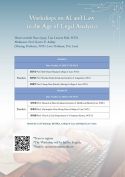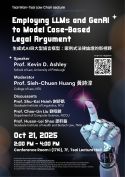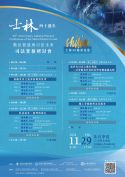數法中心管理員
The 4th Asia-Pacific Trusts Law (APTL) Symposium
Overview
The 4th Asia-Pacific Trusts Law (APTL) Symposium was held on December 12–13, 2025, at the College of Law, National Taiwan University. Supported by research funding from the Ministry of Education and the National Science and Technology Council, as well as by the NTU Law Alumni Association, the Symposium was jointly planned by the College of Law, National Taiwan University, the Center for Innovative Enterprise Law, and the Digital Law Center. Continuing the established APTL Symposium series and its comparative and cross-jurisdictional approach, the conference brought together scholars from leading law schools across Asia, Australia, and North America for two days of intensive academic exchange.
Continuing the APTL Symposium series, the conference brought together scholars from the Asia-Pacific region and beyond to engage in sustained comparative and cross-jurisdictional dialogue on the development of trust law in different legal traditions and social contexts. The two-day program consisted of multiple panel sessions chaired by senior scholars, with each session featuring in-depth paper presentations followed by extensive discussion.
Comparative Perspectives on Trust Law
Across the sessions, participants examined the core theoretical foundations and institutional operation of trust law. Key issues included the legal nature of beneficiaries’ rights, the structure of trustees’ powers and duties, asset segregation and third-party effects, and the permissible scope of settlor control. Through comparative analysis of common law and civil law systems, the papers explored how different jurisdictions address similar functional concerns through distinct doctrinal frameworks. Case studies and doctrinal comparisons covered a wide range of jurisdictions, including Japan, Australia, Korea, New Zealand, China, Thailand, Macau, Singapore, India, and Taiwan, highlighting both converging trends and persistent structural tensions.
Regulation, Markets, and Social Functions of Trusts
Several sessions focused on the regulatory dimensions of trust law in contemporary financial and commercial contexts. Discussions addressed real estate investment trusts (REITs) and investment trust regimes in major Asian markets, emphasizing that market performance depends less on formal legal classification than on taxation policy and regulatory design. Other papers examined the implementation of anti-money laundering (AML) standards and beneficial ownership transparency, particularly in response to international norms such as the FATF recommendations, illustrating how regulatory pressure has reshaped trust law frameworks in different jurisdictions.
Beyond financial applications, the Symposium devoted substantial attention to the expanding social functions of trust law. Comparative studies on special needs trusts, elderly care trusts, and charitable trusts demonstrated how trust law has evolved into a key legal mechanism for addressing aging societies, social welfare needs, and family governance challenges across jurisdictions.
Private International Law and Concluding Reflections
In its concluding sessions, the Symposium turned to choice-of-law issues in private international law, examining how different legal systems conceptualize property and obligations in cross-border trust disputes. Participants observed that, given deep structural differences among legal traditions, the pursuit of formal uniformity in choice-of-law rules is often unrealistic. Instead, emphasis should be placed on achieving functional consistency in legal outcomes within existing legal frameworks.
The Symposium concluded with closing remarks reflecting on the value of sustained comparative engagement and international academic collaboration. The discussions throughout the two days underscored the continuing relevance of trust law as a dynamic legal institution shaped by regulatory pressures, social change, and cross-jurisdictional interaction, and reaffirmed the importance of the APTL Symposium as a platform for advancing comparative trust law scholarship.
活動報導 | 2025年第四屆亞太信託法國際研討會
2025年第四屆亞太信託法國際研討會(The 4th Asia-Pacific Trusts Law (APTL) Symposium)於 2025 年 12 月 12 日至 13 日在國立臺灣大學法律學院舉行。本屆研討會係在教育部及國科會、臺大法律學院校友會支持下,由臺大法律學院、企業法制創新研究中心及數位法律研究中心共同規劃,延續 APTL 系列研討會一貫之比較法與跨法域研究取徑,匯聚來自亞洲、澳洲與北美多所頂尖法學院之學者,進行為期兩日的密集學術對話。
本次研討會聚焦信託法於不同法系與社會脈絡中的制度發展與調適,討論主題涵蓋信託法的核心理論與實務議題,包括受託人與受益人之權利結構、資產隔離與第三人效力、委託人控制權的界線,以及信託制度在不同監管體系下的制度設計。多篇論文透過普通法系與大陸法系的比較分析,深入探討日本、澳洲、韓國、紐西蘭、中國、泰國與澳門等法域在信託制度上的異同與制度張力,凸顯信託法在全球法制移植與在地化過程中所面臨的共通挑戰。
除傳統商業與金融信託議題外,研討會亦關注信託法在當代社會中的新角色與功能,包括不動產投資信託(REITs)與投資信託之監管模式、反洗錢與實質受益人透明化要求,以及高齡化社會脈絡下之特殊需要信託、安養信託與慈善信託等議題。相關討論顯示,信託制度已逐步由單一的財產管理與金融工具,轉化為回應社會福利、家族治理與公共利益的重要法律機制。
研討會最後亦就信託相關之國際私法選法問題,以及不同法系對財產與債權概念之差異展開討論,指出在法制多元並存的現實下,與其追求形式上的選法統一,不如致力於在既有架構中促成制度運作結果的一致性。透過本屆研討會之深入交流,與會學者共同展現跨法域比較研究在信託法發展上的理論意義與實務價值,亦為未來持續深化國際學術合作奠定良好基礎。
Research Feature|AI and Legal Scholarship in Taiwan
Our study, “Fine-Tuning LLMs for Legal Knowledge Assessment: A Taiwan Case Study,” was invited by the Legal Design Lab at Stanford Law School to be presented at the AI & Access to Justice Webinar on June 6, 2025. Following the presentation, members of the Lab helped adapt and rewrite the work into an article published on Medium, introducing Taiwan’s experience to the global academic and legal communities.
This research examines how open-source language models can be fine-tuned with locally sourced legal data in the Taiwan context, so that they can better understand and respond to professional legal knowledge—particularly exam-style questions requiring legal reasoning and judgment. Our findings demonstrate that the integration of local legal corpora significantly improves model performance, underscoring the importance of domain- and jurisdiction-specific data for any LLM seeking to operate in the legal domain.
The Taiwan case therefore offers a valuable pathway for the integration of AI and legal education, with broader implications for access to justice and legal innovation.
👉 Read the full Medium article:
https://medium.com/legal-design-and-innovation/fine-tuning-llms-for-legal-knowledge-assessment-a-taiwan-case-study-7cee320fd3d1
研究成果報導|在地法學與AI的結合
本中心之研究 “Fine-Tuning LLMs for Legal Knowledge Assessment: A Taiwan Case Study”,獲史丹佛法學院Legal Design Lab (https://justiceinnovation.law.stanford.edu/projects/ai-access-to-justice/) 邀請,於 2025年6月6日的 AI & Access to Justice Webinar 中進行報告。其後,該實驗室成員將研究內容整理與改寫,並發表於 Medium 平台,向全球學界與實務界介紹臺灣的研究成果與實作經驗。
此研究是在台灣法學語境下,透過本土資料對開源語言模型進行微調(fine-tuning),使模型更準確地理解與回應法律專業知識,尤其是考試型題目的判斷與推理能力。研究顯示,在地化的法律知識加入後,模型的表現有明顯提升,亦凸顯出「跨法域模型若欲進入法律領域,仍需結合本地法律語料」之重要性。台灣法學與AI的結合因此具有相當的國際代表性與應用潛力。
歡迎點選下列連結閱讀完整報導,共同思考 AI 在法律教育與司法實務中的可能方向。
👉 [閱讀 Medium 報導] https://medium.com/legal-design-and-innovation/fine-tuning-llms-for-legal-knowledge-assessment-a-taiwan-case-study-7cee320fd3d1
Workshops on AI and Law in the Age of Legal Analytics
Venue: 1701, Tsai Lecture Hall, NTU
Moderator: Prof. Kevin D. Ashley (Visiting Professor, NTU Law; Professor, Pitt Law)
Session I
Date: 17:30-19:15, October 14, 2025
Panelists:
Prof. Sieh-Chuen Huang 黃詩淳 (College of Law, NTU)
Prof. Shu-Kai Hsieh 謝舒凱 (Graduate Institute of Linguistics, NTU)
Prof. Chung-Chia (Patrick) Huang 黃種甲 (College of Law, NTU)
Session II
Date: 17:30-19:15, October 21, 2025
Panelists:
Prof. Hsuan-Lei Shao 邵軒磊 (Graduate Institute of Health and Biotech Law, TMU)
Prof. Christopher Chao-Hung Chen 陳肇鴻 (College of Law, NTU)
Prof. Chao-Lin Liu 劉昭麟 (Department of Computer Science, NCCU)
Hosted by UAAT-[Strategy II] Office, College of Law, and Digital Law Center.
※ This Workshop will be held in English
※ Inquiry: Email住址會使用灌水程式保護機制。你需要啟動Javascript才能觀看它
Employing LLMs and GenAI to Model Case-based Legal Argument
Employing LLMs and GenAI to Model Case-based Legal Argument
(生成式AI與大型語言模型:案例式法律論證的新視野)
Speaker: Prof. Kevin D. Ashley (School of Law, University of Pittsburgh)
Moderator: Prof. Sieh-Chuen Huang 黃詩淳 (College of Law, NTU)
Discussants:
Prof. Shu-Kai Hsieh 謝舒凱 (Graduate Institute of Linguistics, NTU)
Prof. Chao-Lin Liu 劉昭麟 (Department of Computer Science, NCCU)
Prof. Husan-Lei Shao 邵軒磊 (Graduate Institute of Health and Biotech Law, TMU)
Date: October 21, 2025 (Tuesday)
Time: 14:00-16:00
Venue: First Conference Room (1710), Tsai Lecture Hall
College of Law, National Taiwan University
Hosted by UAAT-[Strategy II] Office, College of Law, and Digital Law Center.
※ This public lecture will be held in English
※ Eligible for service learning or graduation hours to both undergraduates and postgraduates.
NTU–Waseda–Cornell Workshop on Interdisciplinary Studies of Law Successfully Concludes
On August 4, 2025, the “NTU–Waseda–Cornell Workshop on Interdisciplinary Studies of Law” was held at the First Conference Room (Room 1710), Tsai Lecture Hall, College of Law, National Taiwan University (NTU). This year marked the first time NTU, Waseda University, and Cornell University jointly organized such an academic exchange. The workshop was designed as a two-part event: the first segment took place on July 30-31 at Waseda University, featuring presentations by Cornell and Waseda faculty with commentary from NTU scholars. The second segment, hosted at NTU on August 4, reversed the roles—Cornell and NTU professors delivered presentations while Waseda faculty provided commentary. The collaboration aimed to foster cross-institutional and interdisciplinary research in law, with topics spanning AI and legal explainability, empirical studies of Taiwan’s citizen judge system, patent exhaustion in the IoT era, and corpus analysis of constitutional texts. The workshop opened at 9:10 a.m. with welcome remarks from Dean Huang-Yu Wang.
Morning Sessions
The first session began at 9:20 a.m., with Professor Sieh-Chuen Huang presenting “What Explainability Means in Law,” exploring how scientific notions of “interpretability” and “transparency” in AI can be translated into normative legal standards. Professor Valerie Hans commented on the psychological factors influencing public trust in machine decision-making, while Professor Takashi Kubota addressed broader questions about the origins of trust in judicial systems.
At 10:30 a.m., Professor Hans delivered the second keynote, offering initial observations on Taiwan’s citizen judge system since its implementation in 2023, and comparing it with jury systems in other countries. Her assessment of Taiwan’s early results was notably positive. Commentators included Professor Keng-Wei Fan, who shared preliminary findings from experimental research commissioned by Taiwan’s Judicial Yuan, and Professor Chung-Chia Huang, who urged caution in interpreting high satisfaction survey results and noted the potential bias introduced by judicial discretion in selecting cases for citizen judge trials.
The third morning session, starting at 11:40 a.m., featured Professor Hao-Yun Chen discussing new challenges to patent exhaustion in the IoT era, comparing the approaches of Taiwan, Japan, and the United States. The discussion with Professor Masabumi Suzuki and Professor Yun-Chien Chang delved into the rationale for extending patent rights to downstream uses of patented goods, drawing parallels with covenants in common law property systems. The morning program concluded at 12:40 p.m., with coffee, tea, fruit, and lunch provided for participants.
Afternoon Sessions
The afternoon program opened at 2:00 p.m. with Professor Dan Awrey’s talk on “Payment Network Governance,” examining the trade-offs between network stability, accessibility, and investment, and their interaction with policy goals such as consumer protection, financial crime prevention, financial inclusion, and systemic stability. Professors Kubota and Professor Chen served as commentators.
At 3:10 p.m., Professor Chung-Chia Huang presented his use of natural language processing (NLP) to analyze the influence and longevity of constitutional texts. Using a dataset of over 500 constitutions and reference points from four core and twelve iconic constitutions, his findings showed the enduring global influence of the U.S. Constitution (1791) and the French Constitution (1848). Commentators Professor Awrey and Professor Huang (Sieh-Chuen) discussed methodological considerations in translation and alternative influence metrics.
The final session at 4:20 p.m. featured Professor Yun-Chien Chang applying complex systems theory to compare trust law in common law and civil law systems. He proposed conceptualizing trust as a “semi-property” to bridge functional gaps in civil law jurisdictions. Professors Suzuki and Professor Yi-Wen Chang commented on parallels with other contractual arrangements trending toward property-like status. The day’s program concluded at around 5:20 p.m.
A Platform for Future Collaboration
The workshop’s intensive schedule and in-depth exchanges fostered robust academic dialogue among faculty and students from all three universities, laying a strong foundation for sustained collaboration in interdisciplinary legal research.
2025 Highlights of the NTU-Hamburg Collaborative Course: Legal Challenges of AI in Healthcare
2025 Highlights of the NTU-Hamburg Collaborative Course: Legal Challenges of AI in Healthcare
In response to the rapidly evolving landscape of artificial intelligence (AI) and its implications for the legal profession, the College of Law at National Taiwan University (NTU Law) continues to lead international academic engagement through cutting-edge educational initiatives. In 2025, the College once again partnered with the University of Hamburg Faculty of Law to offer the second edition of the "Digitalization of Law" transnational intensive course, with a specialized focus on the legal challenges of AI in healthcare. In an era where AI is transforming every corner of society at unprecedented speed, the intersection of AI and healthcare has become a vital frontier. From diagnostic tools and treatment planning to predictive analytics and patient monitoring, AI is reshaping decision-making processes and operational models in healthcare systems. However, this transformation also brings with it complex legal and ethical challenges, including patient rights, data protection, liability, and regulatory frameworks.
To cultivate legal professionals equipped to navigate this emerging landscape, the 2025 course built upon the first edition’s broad exploration of AI and legal systems, delving deeper into medical applications and encouraging students to actively engage in academic research and comparative legal discussion. The program was structured in two phases: the first held in Taipei (April 7 to 17) and the second in Hamburg (June 10 to 20), with 16 students (eight from each university) participating in lectures, site visits, and joint presentations. The Taipei phase featured joint instruction by faculty from both universities, covering topics such as criminal liability in AI-assisted diagnosis, anonymization and protection of medical data, algorithmic transparency, patient autonomy and informed consent, medical ethics, and legal frameworks for AI-powered medical tools. NTU invited experts in criminal law, privacy law, tech law, and bioethics to guide students through theoretical debates and case studies. Students also visited institutions such as the Ministry of Justice Academy for the Judiciary, the Shilin District Prosecutors Office, and the NTU Cancer Center, gaining a deeper understanding of the intersection between law and medicine. In addition to academic sessions, cultural excursions such as visits to the National Palace Museum and the Jing-Mei White Terror Memorial Park helped students contextualize Taiwan’s legal system, political transition, and healthcare governance in the framework of transitional justice. These experiences offered not only historical and political context but also critical insight into how law is shaped by national identity and past trauma.
The Hamburg phase, co-organized by the University of Hamburg Faculty of Law and the University Medical Center Hamburg-Eppendorf (UKE), expanded the interdisciplinary foundation by incorporating clinical insights and a European legal context. Students explored topics such as medical informatics, AI applications in radiology, and ethical concerns in digital medicine. A highlight of this phase was the visit to UKE’s Martini-Klinik, where students observed a live surgery and engaged in discussions about the real-life integration of AI tools in clinical settings. These direct experiences brought legal theories to life and allowed students to critically examine the legal and ethical responsibilities of healthcare providers in AI-assisted environments. Beyond academic activities, the two-week exchanges in both Taiwan and Germany offered students an immersive experience in different legal cultures and social environments. German students, during their April stay in Taipei, engaged with NTU students and faculty, visited institutions, and participated in cultural activities. They encountered Taiwan’s legal and healthcare frameworks and gained unique perspectives on Taiwan’s democratization process, forensic institutions, and public-private healthcare cooperation. Likewise, NTU students in Hamburg not only attended lectures and institutional visits but also experienced German social values, healthcare systems, and professional norms through daily life interactions. This immersive exchange allowed both Taiwanese and German students to deepen their understanding of each other’s legal and healthcare systems. Through classroom discussions and cultural interaction, they gained valuable insight into how societal values influence legal interpretation and policy-making.
Through these mutual experiences, both groups of students developed a richer appreciation for the historical, cultural, and institutional contexts that shape legal systems. They not only recognized the differences between Taiwan and Germany’s legal cultures but also built common ground through academic dialogue, interpersonal trust, and shared reflection. These exchanges enhanced students’ comparative research capacity, critical thinking, and ability to approach global challenges with empathy and nuance. The final two days of the course were dedicated to student presentations, where mixed teams from both universities presented their findings on key legal issues in AI healthcare. Topics included data protection and anonymization, intellectual property in medical AI innovation, algorithmic bias and systemic risks, informed consent under AI assistance, and legal frameworks for AI-driven healthcare commercialization. These presentations demonstrated strong legal reasoning, academic rigor, and cultural sensitivity, and provided a valuable opportunity for students to synthesize their learning.
As a testament to the program’s effectiveness, one student from the 2024 cohort has already initiated the process of applying for a joint doctoral degree program with the University of Hamburg. This tangible outcome reflects the course’s ability to stimulate academic motivation and foster meaningful cross-border academic engagement. It demonstrates that the program is not only a temporary exchange but a catalyst for long-term academic collaboration and the cultivation of global legal scholars. Through this course, which integrates theory, empirical inquiry, and international collaboration, the College seeks to cultivate future legal professionals capable of understanding complex global issues and contributing meaningfully to legal and technological innovation. By spearheading such initiatives, the College of Law reaffirms its commitment to academic excellence, comparative legal education, and interdisciplinary growth on the global stage. By providing students with first-hand insights, intercultural collaboration, and a deep understanding of legal systems in transition, NTU Law continues to nurture a new generation of legal scholars and practitioners prepared to meet the demands of the AI era.






